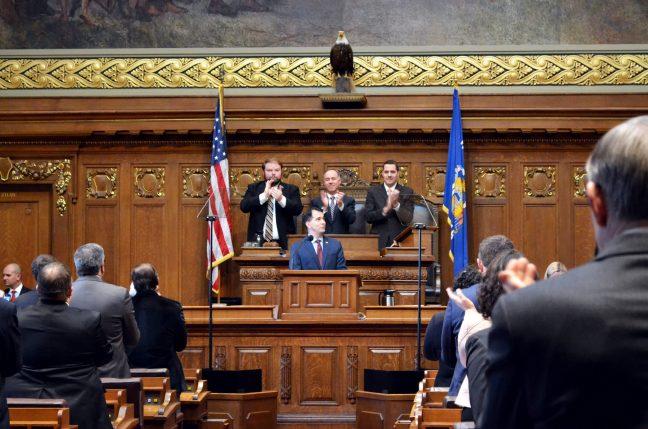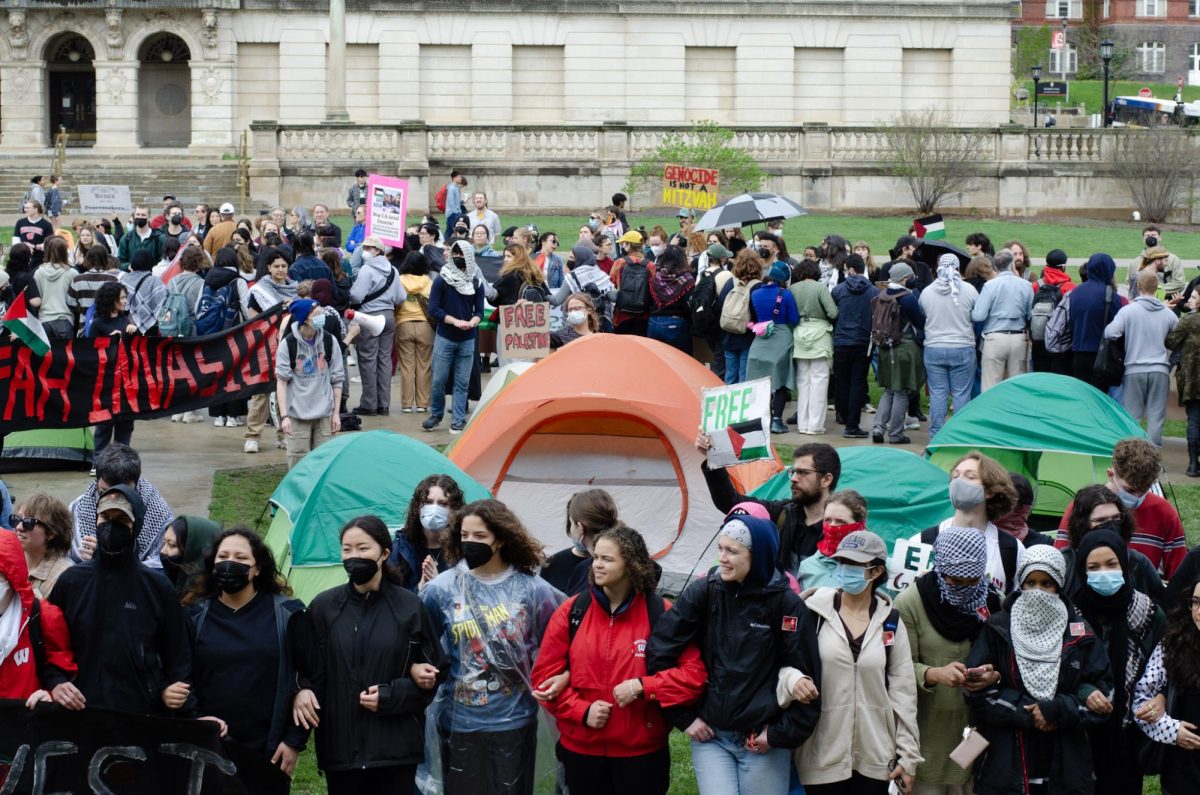Gov. Scott Walker laid out his state biennial budget proposal Wednesday, calling for an increase in education funding and a tuition cut for University of Wisconsin in-state undergraduates.
Walker painted a rosy picture of the state economy and current state budget, calling it “outstanding.” He said unemployment is the lowest it’s been since January 2001, and the Bureau of Labor Statistics lists unemployment at 4 percent in December, continuing a downward trend.
The proposed budget would invest $11.5 billion in public education, which Walker said is the highest amount in state history, and increase state funding for the University of Wisconsin System $140 million over two years.
“Wisconsin needs to be a leader in providing quality higher education that is indeed affordable,” Walker said.
Walker’s budget proposal also cuts in-state undergraduate tuition 5 percent across the UW System — which seems to be the first state-mandated cut in the system’s history.
The proposed budget would tie $42.5 million of new funding for the UW System to new performance standards including improving college affordability and enhancing work readiness.
In addition to providing state-wide tuition cuts, the budget would provide $10 million in additional need-based financial assistance for UW students through the Wisconsin Grant program and $700,000 through the Flexible Options program.
“We’re putting more money into public education than ever before, making college even more affordable, caring for the truly needy, building a stronger infrastructure, rewarding work and cutting taxes to the lowest point in decades,” Walker said.
The UW System saw a budget cut of $250 million in the 2015-17 state budget.
UW Chancellor Rebecca Blank called the past combination of tuition freezes and budget cuts a “double whammy” to the university’s revenue in a Board of Regents meeting this month.
Chancellor Blank lays out plan to give first generation transfer students free tuition
At the meeting, Blank outlined a plan to offer free tuition to some first-generation transfer students, saying the plan is contingent on sufficient new investment in the state budget.
In addition to funding the UW System, Walker proposed plans to increase investments in technical colleges across the state.
The Wisconsin Technical College System would receive a $10 million increase in funding from the state budget.
“Wisconsin’s 16 technical colleges are helping us fill high-demand career areas,” Walker said.
UW students enrolling in 2018-19 could also see changes to their graduation requirements. Students would have to complete an internship or work experience during their time at college to graduate with a bachelor’s degree. The Board of Regents would establish specific policies for this requirement.
The budget would also allow students to opt-out of paying segregated fees, which are fees students pay to fund services like free bus passes, mental health support and some student groups.
Walker’s budget proposal decreases in-state tuition, raises student concerns
Along with higher education, K-12 education would also see an investment totaling $648.9 million per year in additional state funding.
Walker praised the controversial Act 10 reform, which ended collective bargaining for union workers and sparked large-scale protests at the Capitol in 2011. He referenced a study from the conservative-leaning MacIver Institute, which states Act 10 saved taxpayers more than $5 billion over five years.
He also proposed plans to self-insure state employees, which would have the state pay employee health claims directly rather than pay monthly premiums to health insurers.
Walker’s office says the plan, which needs Joint Finance Committee approval, would save $60 million over the two-year budget
“Following up on a promise made in the 2016 State of the State address, we spent more than a year examining ways to improve how government provides health insurance to state employees,” Walker said.
He also addressed his “Wisconsin Works for Everyone” welfare reform package, which he rolled out late last month. The proposal includes new requirements for families receiving welfare assistance and could impact an estimated 7,000 households.
These stipulations include extending the requirement food stamp recipients must be working to parents of school-aged children. It requires those adults work at least 80 hours a month to receive food stamps.
Walker also proposed lowering property taxes, expanding broadband internet services throughout the state and funding local transportation-related projects like road and bridge repairs.
“This is a solid budget built on a strong foundation,” Walker said.
While Walker’s Republican colleagues have applauded his proposal, particularly his investments in education and infrastructure, some called for adjustments to his plan.
Assembly Speaker Rep. Robin Vos, R-Rochester, praised Walker’s proposed budget in a statement, but said he would like to see additional revenue increases for transportation, “so we’re not just putting more on the state’s credit card.”
Vos also said he hopes they will be able to announce in the next several weeks a task force for a general school funding formula.
The Republican Party of Wisconsin spokesperson Alec Zimmerman also lauded Walker’s anticipated budget for its “bold reforms” in a statement.
“As the governor delivers his vision for the future, it will be even more clear how his fight for student success, government accountability, and low taxes all help to move our state forward,” Zimmerman said.

But some Democrats in the Legislature were concerned his proposed investments in the UW System would not make up for the previous years in system cuts.
Rep. Chris Taylor, D-Madison, said the measures proposed in the budget are not enough to retain professors at UW.
“I don’t think this budget is going to fill the devastating consequences of three budget cycles of cutting and gutting the UW,” Taylor said.
Prior to Walker’s address, Democratic legislators on the Joint Committee on Finance said in a news conference, where they said the proposals are an “acknowledgement of his failure” to prioritize certain programs.
Sen. Jon Erpenbach, D-Middleton, said in the statement he was skeptical how realistic the proposals will be when it comes to submitting a balanced budget.
Rep. Gordon Hintz, D-Oshkosh, said throughout his time as governor, Walker has “applied a slash and burn approach” to funding education to lower taxes for the wealthy.
“The fact that he is now trying to take credit for pretending to fix the problems he created isn’t fooling anyone,” Hintz said.





















